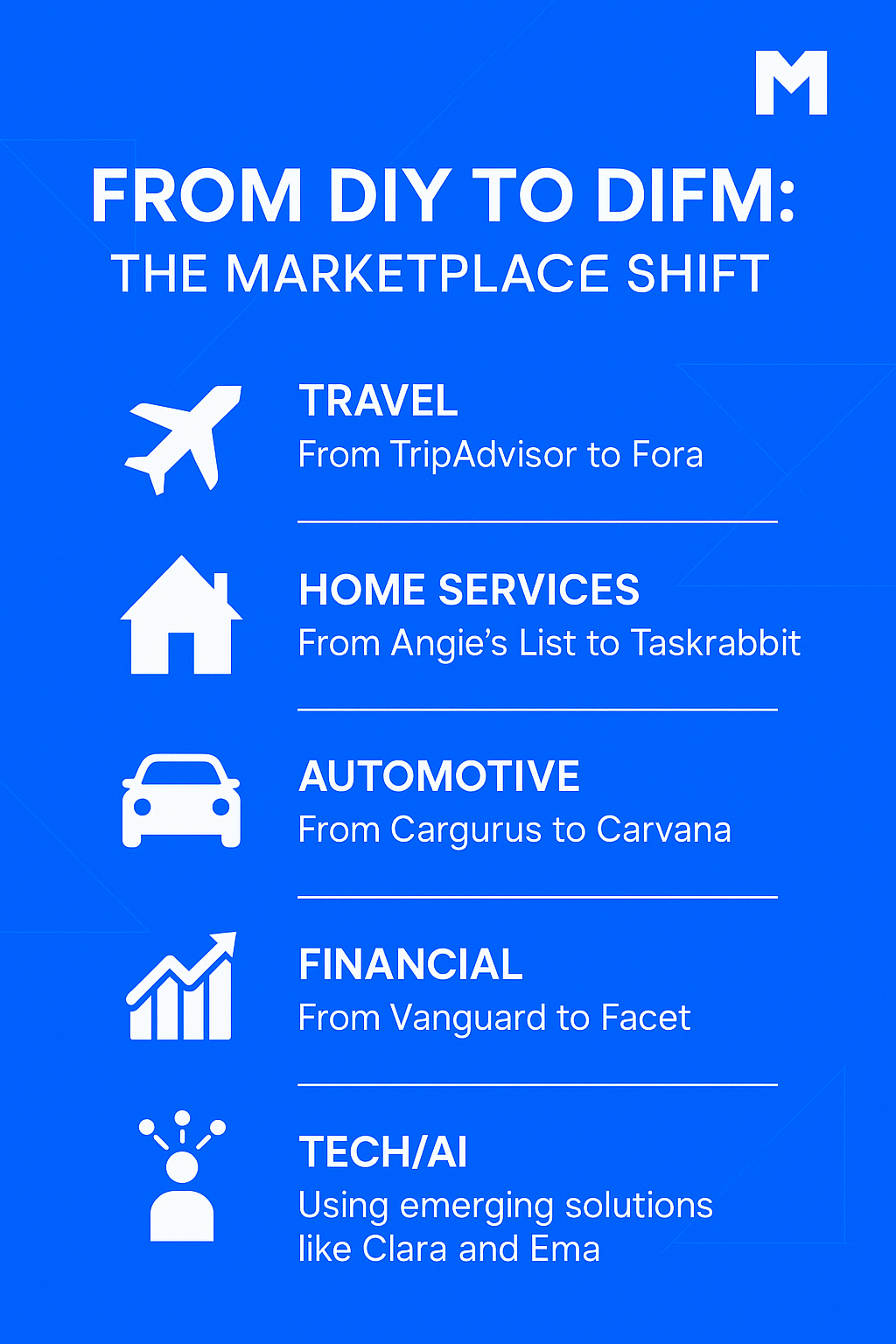Table of Contents
I love watching innovation in online marketplaces - often because I’ve seen firsthand how a single shift in consumer behavior can crack open a brand new business category. There’s something magical that happens when millions of people quietly, collectively, start asking for more help. Suddenly, last year’s cutting-edge product looks clunky and out of step with what customers want today.
Right now, we’re in the middle of one of these pivots. For years, online marketplaces were built for the “do it yourself” crowd. If you wanted to book a vacation or buy a car, the biggest names expected you to roll up your sleeves, dig into the research, filter through the listings, and make the decision solo. Consumers loved all the choices. They took pride in being their own experts. If you wanted it done right, you did it yourself.
But over the last couple years, I’ve watched a tidal wave building - consumers aren’t satisfied with DIY anymore. They want someone, or something, to step in and do it for them. Whether the help comes from a friendly advisor or a savvy AI agent, customer demand is moving toward “do it for me” marketplaces. The companies who win are the ones who make life easier, not just cheaper.
Travel: From TripAdvisor to Fora and Beyond
Travel is one of the original frontiers of online DIY. For over a decade, if you wanted to plan a trip, your first stop was probably TripAdvisor or Booking.com. They gave travelers every listing, review, filter, and price point imaginable. Research was the name of the game. You could spend hours, even days, building your own itinerary from scratch. For a certain kind of traveler, that was half the joy.
Fast forward. Now, services like Fora and Origin are flipping the script. Travelers don’t want to get lost in thousands of reviews or jump between browser tabs for hours. What they want is an expert - sometimes a human advisor, sometimes a sophisticated agent - that listens to their needs, then delivers a tailor-made trip plan. Fora combines real people (travel agents) with slick online booking. Origin uses AI-driven tools to hand-curate itineraries. The best experience doesn’t come from sorting through information on your own. It’s having someone do the work for you, so you can skip straight to the fun part.
Home Services: From Angie’s List to Thumbtack and Taskrabbit
Remember the thrill of searching for a plumber on Angie’s List? You’d compare ratings, call around, maybe read a few reviews to figure out who felt trustworthy. You weren’t getting help with the job itself, just the research process. Angie’s List and HomeAdvisor made it easier to find providers, but you still had to chase them down. It was DIY at its core.
Compare that to Taskrabbit or Thumbtack today. They don’t just show you a list of pros and walk away. These new marketplaces match you with vetted professionals in minutes. Often, they handle scheduling, payment, even ongoing communications with the service provider. They take your problem off your hands, rather than leaving you to coordinate everything. It’s not about finding the right person anymore - it’s about having the job handled for you, beginning to end.
Ready to drive more growth & achieve bigger impact?
Leverage my 25+ years of successes and failures to unlock your growth and achieve results you never thought possible.
Get StartedAutomotive: From Cargurus to Carvana and Shift
Car shopping used to mean browsing endless classified ads on Cargurus, haggling, arranging your own financing, and hoping you didn’t overlook something wrong with the vehicle. Everything was DIY: research, negotiation, inspection, payment, pickup.
Now, look at Carvana or Shift. These companies recognize that most people find the old process exhausting, not empowering. Their DIFM approach: you do the browsing, but they take care of everything else - scheduling a test drive to your doorstep, handling paperwork, managing the trade-in, and even delivering the car to your home. They use technology to make the whole transaction feel as close to “done for you” as it gets.
Financial Services: From Vanguard to Facet Wealth
Investing was once the land of the self-directed. Vanguard was the first to let you build your own portfolio, execute trades, and rebalance as needed. It offered freedom, but demanded knowledge and confidence. Many people sat on the sidelines because they didn’t have the time or know-how to get started.
Then came robo-advisors like Betterment, Wealthfront, and human-staffed hybrids like Facet Wealth. Their promise: tell us your goals, and we’ll take care of the rest. They use algorithms and streamlined onboarding to recommend a strategy, do the day-to-day management, and keep you on track. No more poring over index fund options or obsessing over asset allocation; they deliver professional money management to everyday investors, on autopilot.
Consumer Electronics
Best Buy was the original big-box destination for “do it yourself” shopping. You rolled up to the store, wandered the aisles, read comparison cards, and (maybe) flagged down an employee for advice. Their online platform followed the same mentality - endless choice, but you pull the trigger.
Today’s equivalent is more like Enjoy, a service that delivers electronics and sends an expert to your home to help set them up, connect devices, and answer questions. The product is only half the solution; the help is just as important. The experience feels more tailored, more personal, and far more convenient.
What’s Behind the Shift?
A lot of folks assume that laziness drives consumers from DIY to DIFM, but I don’t buy it. People are busier than ever, but in reality, they’re hungry for outcomes, not just options. Here are a few reasons I see behind the shift:
- Information Overload. Back in the early days, giving consumers massive choice felt revolutionary. But as supply exploded, the sheer number of options became paralyzing - not liberating. DIFM marketplaces aren’t just responding to a need for convenience. They’re creating peace of mind in a world where “doing more research” doesn’t always yield a better outcome.
- The Rise of Personalization. AI and better data allow marketplaces to tailor recommendations to each user. But it only works if you harness those insights to create “done for you” options. When trip planners and car buying services leverage your preferences to deliver an exact fit, they provide a delight that DIY tools never could.
- Trust in the Platform. The old do-it-yourself platforms worked when consumers wanted transparency and control. But as brands built their reputation and demonstrated reliability, shoppers grew comfortable handing over more of the process. Strong marketplaces now deliver on trust, so people worry less and delegate more.
- Desire for Experience, Not Effort. Consumers realize their most scarce resources are time and attention. A great vacation isn’t measured by how many hours you spent planning it. A new car isn’t more enjoyable because you negotiated harder. The focus has shifted to the experience itself, not the labor to get there.
Where does AI fit in?
You can’t have a real conversation about DIFM without talking about AI agents. A few years ago, “done for you” meant a human advisor or concierge. Now, AI-powered agents can answer questions, handle bookings, personalize recommendations, and even triage support issues. More often, the winning marketplaces blend AI and humans, so the best support comes both instantly and with empathy.
Take Ema, which helps consumers negotiate lower bills on recurring services, or Clara, which acts as your personal insurance agent. These new digital assistants live inside the platforms, moving us further from DIY and deeper into automation. When the AI can handle the simple stuff, and a human can step in for the complicated edge cases, the customer feels truly taken care of.
How Product Leaders Can Respond
If you’re running an online marketplace, or brainstorming your next category-defining startup, here’s what I encourage you to do:
- Talk to your customers - even the ones who love your platform already. Ask what they wish could be taken off their plate.
- Prototype DIFM solutions. Even if you start manual, you’ll learn volumes about what customers value.
- Invest in trust and reliability. The more you can own the outcome, the more folks will delegate.
- Blend AI and human support. Let each do what it’s best at. Don’t automate the moments where empathy matters most.
- Measure ease, not just usage. Sometimes your best feature is the one your user never knows is there.
Above all: remember, progress is about removing friction. The marketplaces that win the next five years will be the ones that replace research with relief, effort with outcomes, and options with confidence. Don’t be afraid of the shift; run toward it.
Your customers will thank you, and so will your bottom line. And if you need a cheerleader by your side as you start building DIFM features, know I’m rooting for you every step of the way.
Ready to drive more growth & achieve bigger impact?
Leverage my 25+ years of successes and failures to unlock your growth and achieve results you never thought possible.
Get Started

